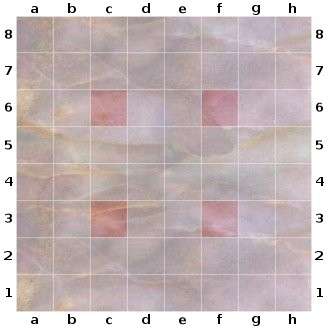Arimaa/Introduction to Strategy/Race Positions
< Arimaa < Introduction to Strategy

| |||||||||||||||||||||||||||||||||||||||||||||||||||||||||||||||||||||||||
| The players are racing to capture pieces as quickly as possible | |||||||||||||||||||||||||||||||||||||||||||||||||||||||||||||||||||||||||
Race positions occur when the two elephants each take control of an opposing trap as in this game diagrammed at right. In a race position, both elephants are clearly free, so elephant mobility is of secondary importance. The critical issue is which elephant can do more damage more quickly.
Race positions are rare because they typically require one player or the other to have misjudged the position in a costly way. The player who is going to lose the race shouldn't have raced in the first place. The ultimate loser will wish he could rewind the game to the move on which he used his elephant to attack rather than defend.
By the same token, however, it is important to know how to play in a race position, so as to be able to judge beforehand whether or not to race. One strategic point is that an elephant assisted by other pieces usually makes progress faster than an unaided elephant. Another point is that an advanced rabbit makes an attack much more potent by threatening to make goal, and may force the opposing elephant to break off its attack, wasting a couple of moves to cross over and defend.

| |||||||||||||||||||||||||||||||||||||||||||||||||||||||||||||||||||||||||
| Goal threats trump capture threats. | |||||||||||||||||||||||||||||||||||||||||||||||||||||||||||||||||||||||||
In the position at left, from this game in the 2006 Arimaa World Championship, Silver is on move. Each player is threatening goal. As soon as one player is forced to defend with his elephant, the game will essentially be over, because the other player will capture the little attacking pieces near the trap where the attack has just been abandoned. In other words, both players have staked the game on the outcome of this race.
Silver should consider using his camel to push the d6-rabbit back to d5. It may endanger the silver camel to bring it nearer to the gold elephant, but in a goal race it may be worth sacrificing a camel to buy time. Meanwhile if Gold ends Silver's goal threat by capturing the g3-rabbit, the silver elephant will respond by heading home for defense and capturing the gold f4-camel in f6. Therefore Gold would have to keep racing instead.
Because the cost of losing a race is so high, and because the side with more pieces committed usually makes progress faster, counter-attacks in Arimaa are rare. Usually as soon as one side commits multiple pieces to an attack, the other side defends, hoping to gain a useful hostage or frame, and eventually win slowly due to superior elephant mobility.